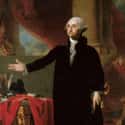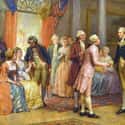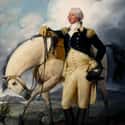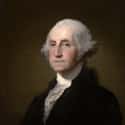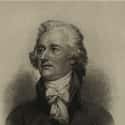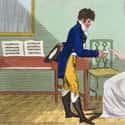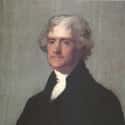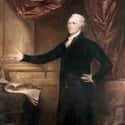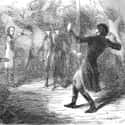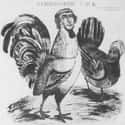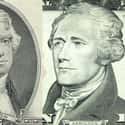-
(#1) Hamilton And Jefferson Were At War With Each Other Over Washington’s Heart
The feud between Hamilton and Jefferson began as a battle for the approval of George Washington. When Washington became America’s first president in 1789, he appointed both men to serve in his cabinet, Hamilton as Secretary of the Treasury and Jefferson as Secretary of State.
Both Hamilton and Jefferson had a close relationship with George Washington. Hamilton was only 22 years old when he served as Washington’s secretary during the Revolutionary War, and the two remained close for years after the war. In fact, Hamilton encouraged a reluctant Washington to run for president, calling Washington “indispensable” to the new nation.
On his end, Jefferson shared a similar background to Washington: Both were Virginia planters, both married widows named Martha, and both distinguished themselves during the Revolution—Jefferson by penning the Declaration of Independence; Washington by winning the war.
Unsurprisingly, both men saw themselves as Washington’s closest advisor, which only fueled the rivalry.
-
(#2) The Two Men Had Very Different Visions For America
Hamilton was from the Caribbean, born the illegitimate son of a Scottish peddler. His adopted home, New York City, shaped Hamilton into a proponent of urban commerce. To Hamilton, America’s cities and its merchant economy would drive progress. He believed a strong central government was necessary for the country’s survival.
In Jefferson’s eyes, Hamilton was advocating a return to European-style monarchy, undoing the progress made during their War for Independence. His own agrarian perspective favored a decentralized government, which he believed would allow for the greatest degree of personal liberty and virtue.
Both men believed they could sway Washington toward their vision for America.
-
(#3) Jefferson Trashed Hamilton To The President, Making The Feud Deeply Personal
Early in Washington's presidency, the General seemed to side with Hamilton more than with Jefferson. This enraged the Secretary of State, who began to see Hamilton in darker terms.
Jefferson was convinced that Hamilton was a corrupt, self-interested monarchist. Jefferson complained to Washington in 1792 that Hamilton had “a squadron devoted to the nod of the treasury.” These men wanted to “form the most corrupt government on earth.”
Washington tried to cool the friction between the two men. In a letter to Jefferson in August 1792, Washington wrote “How unfortunate, and how much is it to be regretted then, that whilst we are encompassed on all sides with avowed enemies and insidious friends, that internal dissensions should be harrowing and tearing our vitals.”
Jefferson didn’t get the hint. Instead, he wrote back to throw Hamilton under the bus––or carriage, since it was 1792. Hamilton’s ideas, Jefferson declared, “flowed from principles adverse to liberty, and [were] calculated to undermine and demolish the republic.”
In short, Jefferson accused Hamilton of being a traitor.
-
(#4) Jefferson’s Baseless Attacks Finally Angered Washington
Jefferson refused to let go of the idea that Hamilton was not just a political rival, but a traitor to their newly-formed United States.
In October 1792, Jefferson told Washington that Hamilton was heading a monarchist plot to seize the government. Jefferson claimed that Hamilton had told him that the “Constitution was a shilly-shally thing of mere milk and water, which could not last and was only good as a step to something better.”
In response, Washington dismissed Jefferson’s claims as ridiculous. The President added that he sided with Hamilton because the New Yorker's plans actually worked, already bringing financial stability to the new country.
In his own response, Jefferson concluded that Washington’s brain was enfeebled by age.
-
(#5) In Their First Major Showdown, Hamilton Clearly Won—But The Fight Wasn’t Over
Hamilton held sway in Washington’s cabinet, but things changed with the election of 1796. Jefferson himself ran for President, but fell short, earning himself a spot as John Adams’s Vice President due to a quirk in the Constitution (which would quickly be corrected).
Hamilton marshaled the Federalists, his political allies in Congress, to oppose Jefferson’s Republican Party. In 1798, Hamilton’s Federalists passed the Alien and Sedition Acts, designed to suppress political dissent.
Jefferson raged against the law, calling it “detestable” and “worthy of the 8th or 9th century.” As for the Federalist government, it was a “reign of witches.” And Jefferson saw Hamilton as the impetus behind the whole mess, proclaiming him “our Bonaparte” at the same time that Napoleon was conquering Europe.
-
(#6) Hamilton Had An Affair, Giving Jefferson The Ammo He Needed To Destroy Him
In 1791, Hamilton met a woman named Maria Reynolds who begged him for help. Hamilton saw Maria as a “beauty in distress” and a “pretty woman.” Their adulterous affair quickly turned to blackmail when Maria’s estranged husband, James Reynolds, demanded one thousand dollars—about $25,000 today—to keep the relationship secret.
Worried that Reynolds would tell his own wife, Hamilton paid the money. He also continued the affair.
When James Reynolds was arrested in November 1792 for forgery, he wrote to Hamilton’s rivals, promising information that would destroy Hamilton’s reputation. James Monroe, who heard Reynolds’s tale, went to Hamilton to hear his side of the story. Hamilton privately confessed the affair, and Monroe agreed to let the matter drop.
But Monroe also made a copy of the letters from Maria Reynolds and gave them to Thomas Jefferson.
-
(#7) Jefferson Waited Five Years To Spill Hamilton’s Secret Affair
As the rivalry between Hamilton and Jefferson boiled, it grew more and more personal. In 1796, while Jefferson was running for President, Hamilton accused the Virginian of hypocrisy. Jefferson might seem like a simple, humble farmer, Hamilton declared, but the Virginian's reputation was “a flimsy veil to the internal evidences of aristocratic splendor, sensuality, and epicureanism.”
Was Hamilton referencing rumors about Jefferson’s affair with his slave—and his dead wife’s half-sister—Sally Hemings?
Jefferson decided it was time to open the floodgates. He turned to his “attack dog,” muckraking journalist James Callender, to finally reveal the salacious tale of Hamilton's affair.
-
(#8) Callender Accused Hamilton Of Adultery And Corruption, Forcing Hamilton To Admit The Affair
James Callender published the story of Hamilton's affair in 1797. He called James Reynolds a pimp and printed Maria’s letters to Hamilton. He also attacked Hamilton's loyalty to his country, writing, “So much correspondence could not refer exclusively to wenching... No man of common sense will believe that it did. Hence it must have implicated some connection still more dishonourable.”
At this, Callender publicly accused Hamilton of large-scale corruption, the same charge that Jefferson had been pushing for years.
Hamilton believed that his only chance to defend himself against the corruption charge was to admit to the affair. “My real crime”––and his only crime––“is an amorous connection with his wife.”
Hamilton’s admission was shocking. Naturally, it did little to help his reputation. One New Yorker told Hamilton, “You have widened the breach of dishonor by a confession of the fact.”
-
(#9) Hamilton Was So Distraught That He Challenged Monroe To A Duel—And Aaron Burr Stopped It
Once news of Hamilton’s affair became public, his reputation was destroyed. Hamilton blamed Monroe, whose name was attached to the documents published by Callender.
In a fury, Hamilton stormed to Monroe’s house, where he implied that the future President was a liar. “Do you say I represented falsely, you are a Scoundrel,” Monroe raged.
“I will meet you like a Gentleman,” Hamilton shot back.
“I am ready, get your pistols,” Monroe replied.
Monroe called on Aaron Burr to serve as his 'second' at the duel. After acting as an intermediary for months, Burr convinced the men not to duel.
-
(#10) Jefferson's Own Muckraking Tactics Turned Against Him When His Own Affair Was Made Public
In the end, the Reynolds Affair destroyed Hamilton’s hope for any future office. Jefferson saw just how useful the muckraker Callender had been, and he used the newspaperman as an attack dog in his campaigns for the presidency.
In 1800, Callender was arrested for writing a vicious anti-Federalist paper—prosecuted under the same Sedition Act that Jefferson had already opposed. By the time Callender got out of jail, Jefferson had been elected President. Callender expected Jefferson to reward him for attacking the Federalists. However, when the President ignored him, Callender began publishing scurrilous—but true—stories about Jefferson’s affair with Sally Hemings.
In the end, Jefferson was caught by the same tactics he had used against Hamilton. As scholar John Dickerson argued, “Thomas Jefferson, in particular, was willing to endorse, finance, and encourage the basest personal attacks on his rivals while bemoaning the coarse nature of the public press.”
-
(#11) Jefferson Trashed His Rival For Years After His Death
In 1804, Alexander Hamilton famously died after a duel with another of his longtime rivals, Aaron Burr.
In 1820, Jefferson was still trashing Hamilton. In a private letter, Jefferson complained that Hamilton was “chained by native partialities to every thing English.” He also argued that Hamilton wanted to destroy America’s insulation from the “abusive governments of the old world.”
In another piece, Jefferson blasted Hamilton with the accusation that the man was “so bewitched and perverted by the British example, as to be under thorough conviction that corruption was essential to the government of a nation.”
The political clash between Hamilton and Jefferson quickly spiraled into something much more personal––and it spawned two of the biggest scandals in early US history: the affairs with Maria Reynolds and Sally Hemings.
New Random Displays Display All By Ranking
About This Tool
With the 1800 presidential election approaching, Americans are more divided than ever. The struggle between the Hamiltonians and the Jeffersonians was a major event after the establishment of the U.S. federal government. Alexander Hamilton and Thomas Jefferson are leaders of the "Federalists" and "Republicans". The feuds between the two most influential politicians greatly promoted the political stability of the United States and the development of capitalism.
Different growth backgrounds and class interests make them have differences in the understanding of democratic political principles. The controversy between them is a controversy between two parties, and even between two political thoughts, which has a profound impact on the American political system. The random tool explained 11 details about their relationship.
Our data comes from Ranker, If you want to participate in the ranking of items displayed on this page, please click here.











